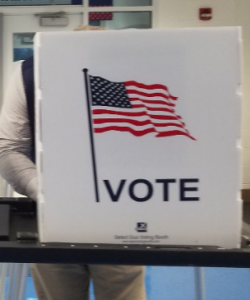Analysis/Jan Hillard: Conspiracy and the 2020 presidential election — how do we end polarization?
In early August, I wrote about “Conspiracy Theories and COVID 19: Better the Devil You Know Than a World You Don’t” (NKY Tribune 8/1/2020). I noted the conspiracy theories that flourished with the presence of COVID. These theories sought to account for the virus’ origin, who benefited from spreading the virus, and the sinister motives of those who warned of the pandemic. I also attempted to provide a background on conspiracies theories in general arguing that Conspiracy theories explain events by referring to a sinister individual or group(s) who have great power, operate covertly, and are poised to take over the societal, political, or economic order. Since these conspiracies operate in secret, believers must accept the elements of the conspiracy on faith. The conspiracy uses circular logic, is resistant to falsification, and employs a logical fallacy called infinite regression (if you can’t prove the conspiracy at one level, it must be hiding at another albeit higher level).
Fast-forward four months and conspiracy theories about the recent Presidential election are rampant. Conspiracy theories explain election losses, offering “comfort” to voters and candidates who seek to neatly and simplistically (not truthfully) explain the loss by faulting others. Two factors explain this: First, Trump’s endorsement of conspiracies and massive fraud have offered powerful rationalizations to him and his followers. There is a tenacity of conspiratorial beliefs absent of facts. Public accusations by Trump or his surrogates amplify false claims, giving them a life of their own. Second, for a significant number of Trump voters these theories and accusations offer a blanket of denial.

The current electoral conspiracies and claims of organized fraud will illustrate the number and scope of ideas that have been offered in the past weeks. For the purposes here, organized election fraud is treated as conspiratorial. These claims have been offered by loyal Trump supporters, right wing groups, Trump sycophants, select media, and President Trump. The following inventory is offered to display the phenomenal scope of conspiracy beliefs, as well as providing a roadmap for documenting these theories and beliefs in the future.
Months ahead of the election, Trump offered a preview of his conspiratorial thinking, claiming the election would be rigged with mail-in ballots the vehicle for fraud. After the election, Trump concentrated on the specifics of the alleged fraud, as did his supporters. A survey conducted by Politico (11/20) found that 80% of Trump voters believe the election was stolen through orchestrated fraud while 12% of Democrats believe this.
The most prominent accusations of wrongdoing include a well-organized Democratic party (and other leftist groups) who formed a national conspiracy against Trump’s re-election. Other accusations include:
• Promulgated “manufactured” poll results prior to the election, disadvantaging Trump
• Blocked Republican observers from watching ballot handling and tallying
• Shuttered ballot locations to prevent anyone from entering
• Found new and fraudulent Biden votes after Trump lead state races
• Falsified results to suppress the Trump vote
• Harassed Republican poll workers with some claiming, “Their lives are now ruined”
• Wholesale destroyed (burning, shredding) Trump ballots
• Counted ballots after poll closing deadlines
• Secretly gave 100,000s of votes to Biden
• Claimed the post office failed to deliver 27% of all mail-in ballots
• Physically prevented Trump voters from voting by organized left-wing groups
• Recruited homeless people to vote
• Claimed that in Wisconsin more people voted than were registered
• Distributed Sharpie pens to invalidate ballot marking
• Submitted mail-in ballots that were never endorsed by the voter as required
• Substituted ballots with a secret watermark added by the Dept. of Defense
• Claimed that ballot counting software algorithms were rigged against Trump. The prominent software companies, Dominion Voting Systems and Smartmatic intentionally miscounted votes, were developed abroad and funded by the Democratic party, China, Communists, the world order, and bureaucratic “Deep State.”
Beyond the troubling numbers of people who have believed, and apparently continue to believe, in conspiracy theories around the 2020 election, lies a more troubling finding.

This finding speaks to the ongoing polarization within the American public. In their study of current attitudes, Politico (11/20/20) finds the following disturbing facts. Democrats and Republicans were asked a set of question about one another. The results show almost parallel sentiments toward one another as seen in the following agreements:
“I have less respect for the other party than before” Democrats 77%, Republicans 81%
“People from the other party are running the country” Democrats 74%, Republicans 80%
“ I am less likely to trust the other party” Democrats 72%, Republicans 75%
“I would be upset if my child joined the other party” Democrats 32%, Republicans 58%
“I would be upset if my child married into the other party” Democrats 50% Republicans 51%
“I would be less likely to hire someone from the other party” Democrats 52% Republicans 50%”
These findings clearly speak to our collective polarization, originating from both sides of the political spectrum.
While it is difficult to establish causality, there is little question that the current atmosphere of conspiracy bolsters and reinforces these deep and troubling divisions. To heal this divide and lessen the impact of conspiracies several actions are required.
First, facts must prevail over tantalizing beliefs.
Second, we must make places for and practice respectful conversations, particularly with those who are polar opposite.
Third, our leaders must practice statesmanship characterized by civility and compromise.
We ought not expect an end to all conspiracy theories. Some people will always need simplistic, blaming explanations that focus on the “other.” We can demand that our leaders not foment and “legitimize” these theories. This will go a long way to cooling the flames of distrust and alienation.
Dr. Jan William Hillard is data editor for the NKyTribune and retired Faculty Emerti from Northern Kentucky University.
*** This article has been archived for your research. The original version from User-generated content can be found here ***

